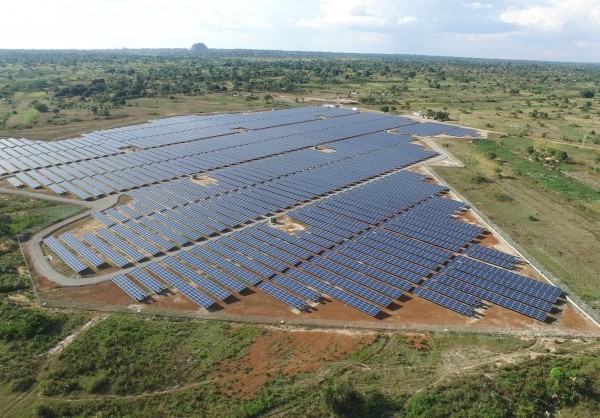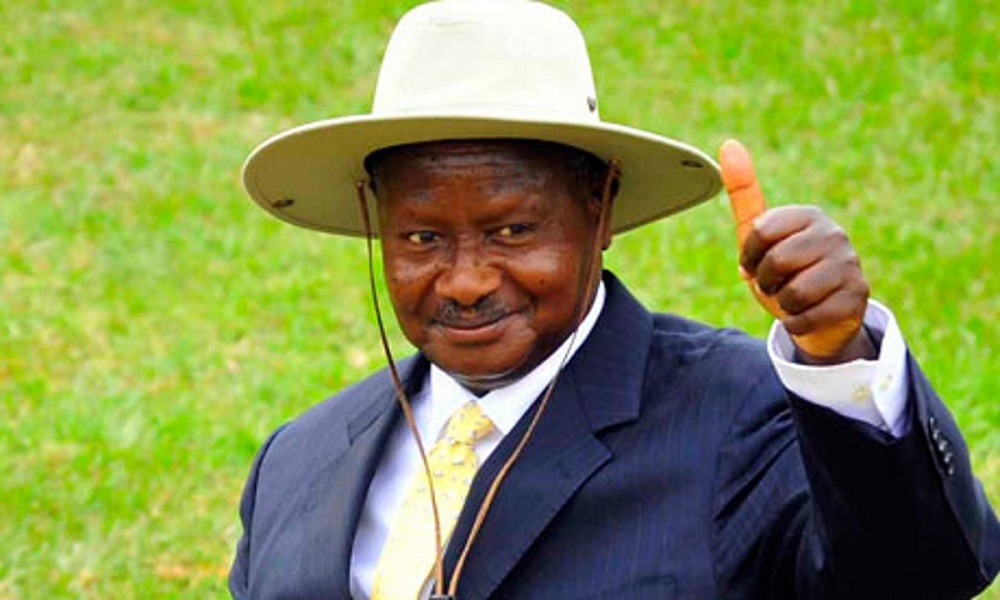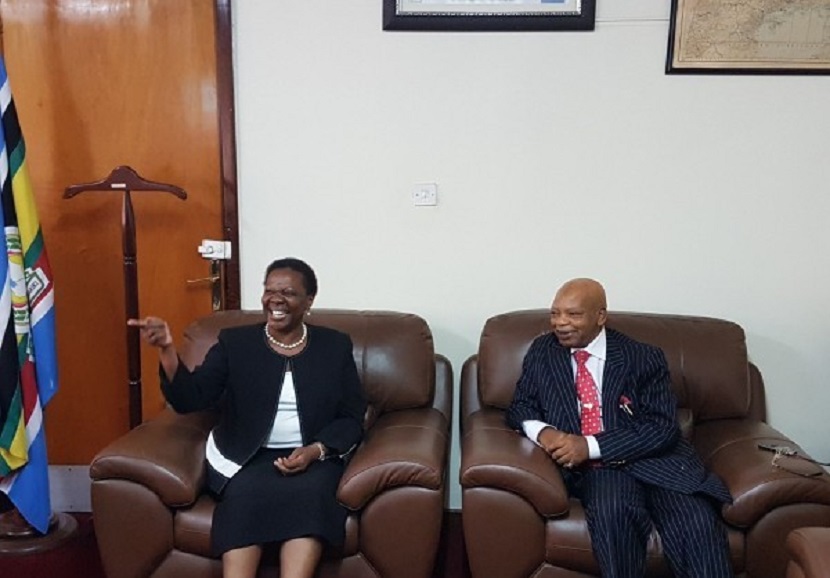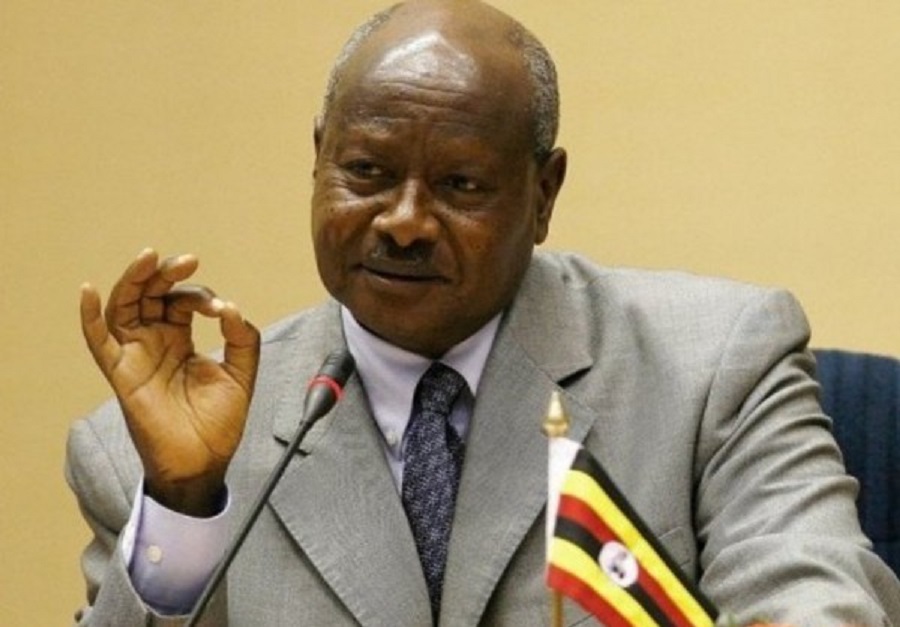Economy
Uganda Commissions East Africa’s Largest Solar Plant


By Dipo Olowookere
A solar power plant has been inaugurated on Monday, December 12, 2016, in Soroti, Uganda amid pomp and pageantry.
It is made up of 32,680 photovoltaic panels and the new 10 megawatt facility is the country’s first grid-connected solar plant and will generate clean, low-carbon, sustainable electricity to 40,000 homes, schools and businesses in the area.
Located on a 33 acre plot of land in Soroti District, the power plant has the potential to increase its net output capacity by a further 20MW of solar energy. At peak construction the plant had over 120 local workers involved, including engineers recruited and trained by Access Power and EREN RE.
Present at the commissioning today were Minister of State for Energy, D’Ujanga Simon, together with representatives of Access Power, EREN RE and donors.
The project was developed under the Global Energy Transfer Feed in Tariff, a dedicated support scheme for renewable energy projects managed by Germany’s KfW Development Bank in partnership with Uganda’s Electricity Regulatory Agency (ERA) and funded by the governments of Norway, Germany, the United Kingdom and the European Union.
The GET FiT programme helps renewable energy sources become more affordable and therefore more accessible in Eastern Africa.
The $19 million Soroti Solar Plant is in part funded by the European Union – Africa Infrastructure Trust Fund through the GET FiT Solar Facility equivalent to 8.7 million euros in the form of result-based premium payments per kWh of delivered electricity.
The project is financed by a mix of debt and equity with the senior debt facility being provided by FMO, the Netherlands Development Bank, and the Emerging Africa Infrastructure Fund (EAIF).
Ambassador Kristian Schmidt, European Union Head of Delegation to Uganda said in his speech: “Uganda is a good place to invest in solar energy. The regulatory framework is conducive and Government rightly recognises Uganda’s energy future must be renewable. It is great that this is now triggering private sector interest in solar power generation. The European Union is proud that our grant contribution ensures the realisation of the Soroti Solar Plant, and I hope this is only just the beginning for many more to come.”
The ERA Chief Executive Officer, Eng. Ziria Tibalwa noted, “that the Access Solar Uganda 10MW grid connected solar P.V project we are launching today is so far the largest in the East African region. We are so proud of this outcome of our stable and favorable regulatory environment that has produced such a leading project in the East African Region. We congratulate Access Solar and the people of Uganda upon this milestone.”
David Corchia, CEO, EREN RE, stated: “Soroti solar plant is an excellent textbook example of how collaboration among key local and international stakeholders can result in the successful execution and completion of such a ground breaking project and in tangible progress in the spread of renewable energy across Africa. We wish to express our gratitude and thanks to the organizations and individuals who made the construction of the largest solar power plant in East Africa possible. As a global renewable energy Independent Power Producer we take this opportunity to reaffirm our commitment to the African power sector and we look forward to replicating this model in many other African countries in other districts in Uganda and across the region.”
Reda El Chaar, Executive Chairman, Access Power declared, “We are thrilled to have been given the opportunity to work with our European and Ugandan partners to bring to reality this flagship solar power plant. Soroti raises the bar on what can be achieved through teamwork and we look forward to more collaborative efforts to expand the footprint of clean energy across this mighty continent.”
Jennie Barugh, Head DFID Uganda on the impact of GET FiT: “As an outward-looking nation, the UK fully supports Uganda in its effort to become a middle income country, with bilateral support of £110m this year. Power is an important enabler of development. GET FiT has helped to demonstrate the success of private sector led renewable energy projects; reducing costs to the government and increasing supply to help the people of Uganda to improve livelihoods and economic empowerment, especially for women and girls, so they can stand on their own two feet. Uganda has led the way in this sector and we expect other African nations to learn from and build on the successes of GET FiT. The Soroti plant is also one of the eight renewable energy projects in Uganda to have benefited from the UK Aid supported Emerging Africa Infrastructure Fund (EAIF) – part of the multilateral Private Infrastructure Development Group (PIDG). The UK is committed to supporting and improving the lives of Ugandans – with the vast majority (80%) living without access to clean modern energy – helping Uganda leave aid dependency behind.”
Linda Broekhuizen, CIO of FMO Dutch development bank, underlines the importance of the project: “FMO is a proud supporter of this project. Renewable energy projects like these are fully in line with our aim to positively affect peoples’ lives by supporting development, creating jobs and providing clean and sustainable energy to Uganda.”
Oscar Kang’oro, a Non-Executive Director of the Emerging Africa Infrastructure Fund (EAIF) confirms EAIF’s commitment to supporting solar and small hydro power projects in Uganda: “EAIF is fully engaged in Uganda and to date financed 8 renewable energy projects in the country, including Soroti. I particularly want to congratulate Access and EREN on their vision and enterprise. Our funders at the UK government’s DFID, at The Netherlands DGIS, Switzerland’s SECO and Sweden’s SIDA, see the great benefits that small and renewable generating capacity can bring, particularly in rural and semi-rural areas. This can unlock economic potential, create new economic development opportunities, grow the productivity of public services and improve energy security. Most importantly, the arrival in a district of more dependable and more affordable electricity can transform and enhance the lives of many thousands of men, women and children.”
Economy
Champion Breweries Concludes Bullet Brand Portfolio Acquisition

By Aduragbemi Omiyale
The acquisition of the Bullet brand portfolio from Sun Mark has been completed by Champion Breweries Plc, a statement from the company confirms.
This marks a transformative milestone in the organisation’s strategic expansion into a diversified, pan-African beverage platform.
With this development, Champion Breweries now owns the Bullet brand assets, trademarks, formulations, and commercial rights globally through an asset carve-out structure.
The assets are held in a newly incorporated entity in the Netherlands, in which Champion Breweries holds a majority interest, while Vinar N.V., the majority shareholder of Sun Mark, retains a minority stake.
Bullet products are currently distributed in 14 African markets, positioning Champion Breweries to scale beyond Nigeria in the high-growth ready-to-drink (RTD) alcoholic and energy drink segments.
This expansion significantly broadens the brewer’s addressable market and strengthens its revenue base with an established, profitable portfolio that already enjoys strong brand recognition and consumer loyalty across multiple markets.
“The successful completion of our public equity raises, together with the formal close of the Bullet acquisition, marks a defining moment for Champion Breweries.
“The support we received from both existing shareholders and new investors reflects strong confidence in our long-term strategy to build a diversified, high-growth beverage platform with pan-African scale.
“Our focus now is on disciplined execution, integration, and delivering sustained value across markets,” the chairman of Champion Breweries, Mr Imo-Abasi Jacob, stated.
Through this transaction, Champion Breweries is expected to achieve enhanced foreign exchange earnings, expanded distribution leverage across African markets, integrated supply chain efficiencies, portfolio diversification into high‑growth consumer beverage categories, and strengthened presence in the RTD and energy drink segments.
The acquisition accelerates Champion Breweries’ transition from a regional brewing business to a multi-category consumer platform with continental reach.
Bullet Black is Nigeria’s leading ready-to-drink alcoholic beverage, while Bullet Blue has built a strong presence in the energy drink category across several African markets.
Economy
M-KOPA Nigeria Plans Expansion to Edo, Others After N231bn Credit Milestone

By Adedapo Adesanya
Emerging market fintech firm, M-KOPA, has announced plans to deepen its reach in Nigeria to the South South and South East regions, starting with Edo this year, after providing N231 billion in credit to over 1 million customers in the country.
The firm released its first Nigeria-focused Impact Report, which showed that Nigeria is M-KOPA’s fastest-growing market and fastest to reach the milestone.
Since its foray into the Nigerian market in 2019, M-KOPA has been working to dismantle barriers to financial inclusion by providing flexible smartphone financing and digital financial tools that align with how people in the informal economy earn and manage their money.
It operates in six states in the country, including Lagos, Ogun, and Oyo, among others.
The report highlights the company’s contribution to income generation, digital inclusion and economic opportunity for Every Day Earners across the country.
The report showed that M-KOPA has enabled 290,000 first-time smartphone users, while 56 per cent of agents accessed their first income opportunity through the platform.
It showed high income and livelihood gains among its users, with about 77 per cent of customers leveraging smartphones or digital loans obtained through the platform to generate income, indicating that access to financed devices is directly supporting micro-entrepreneurial activity and informal sector productivity.
Furthermore, 75 per cent of users report higher earnings since gaining access to M-KOPA’s services, suggesting measurable improvements in personal revenue streams. On the distribution side, 99 per cent of agents disclose increased earnings, reflecting positive spillover effects across the company’s value chain.
In addition, 81 per cent of long-term customers state that their household expenses have improved, pointing to enhanced financial stability and better consumption smoothing over time.
Speaking on the report, Mr Babajide Duroshola, General Manager, M-KOPA Nigeria, said, “Nigeria represents extraordinary potential, and we’re proud that it has become M-KOPA’s fastest-growing market. Our Impact Report shows that when Every Day Earners gain access to the right digital and financial tools, they use them to create stability and long-term progress for their families. This is about access that unlocks opportunity and sustained prosperity.”
On its expansion plans Nigeria-wide, the M-KOPA helmsman said, “Many of the states we are considering are already similar to the ones we are currently in proximity… So, there is proximity and similarity between these states, and that’s what we are going to do, starting with Edo.”
He noted that as M-KOPA Nigeria continues to expand, the focus remains on ensuring more everyday earners gain access to the digital and financial tools they need to build resilient, prosperous futures in Nigeria’s rapidly digitising economy.
Economy
Tinubu Okays Extension of Ban on Raw Shea Nut Export by One Year

By Aduragbemi Omiyale
The ban on the export of raw shea nuts from Nigeria has been extended by one year by President Bola Tinubu.
A statement from the Special Adviser to the President on Information and Strategy, Mr Bayo Onanuga, on Wednesday disclosed that the ban is now till February 25, 2027.
It was emphasised that this decision underscores the administration’s commitment to advancing industrial development, strengthening domestic value addition, and supporting the objectives of the Renewed Hope Agenda.
The ban aims to deepen processing capacity within Nigeria, enhance livelihoods in shea-producing communities, and promote the growth of Nigerian exports anchored on value-added products, the statement noted.
To further these objectives, President Tinubu has authorised the two Ministers of the Federal Ministry of Industry, Trade and Investment, and the Presidential Food Security Coordination Unit (PFSCU), to coordinate the implementation of a unified, evidence-based national framework that aligns industrialisation, trade, and investment priorities across the shea nut value chain.
He also approved the adoption of an export framework established by the Nigerian Commodity Exchange (NCX) and the withdrawal of all waivers allowing the direct export of raw shea nuts.
The President directed that any excess supply of raw shea nuts should be exported exclusively through the NCX framework, in accordance with the approved guidelines.
Additionally, he directed the Federal Ministry of Finance to provide access to a dedicated NESS Support Window to enable the Federal Ministry of Industry, Trade and Investment to pilot a Livelihood Finance Mechanism to strengthen production and processing capacity.
Shea nuts, the oil-rich fruits from the shea tree common in the Savanna belt of Nigeria, are the raw material for shea butter, renowned for its moisturising, anti-inflammatory, and antioxidant properties. The extracted butter is a principal ingredient in cosmetics for skin and hair, as well as in edible cooking oil. The Federal Government encourages processing shea nuts into butter locally, as butter fetches between 10 and 20 times the price of the raw nuts.
The federal government said it remains committed to policies that promote inclusive growth, local manufacturing and position Nigeria as a competitive participant in global agricultural value chains.
-

 Feature/OPED6 years ago
Feature/OPED6 years agoDavos was Different this year
-
Travel/Tourism10 years ago
Lagos Seals Western Lodge Hotel In Ikorodu
-

 Showbiz3 years ago
Showbiz3 years agoEstranged Lover Releases Videos of Empress Njamah Bathing
-

 Banking8 years ago
Banking8 years agoSort Codes of GTBank Branches in Nigeria
-

 Economy3 years ago
Economy3 years agoSubsidy Removal: CNG at N130 Per Litre Cheaper Than Petrol—IPMAN
-

 Banking3 years ago
Banking3 years agoSort Codes of UBA Branches in Nigeria
-

 Banking3 years ago
Banking3 years agoFirst Bank Announces Planned Downtime
-

 Sports3 years ago
Sports3 years agoHighest Paid Nigerian Footballer – How Much Do Nigerian Footballers Earn
















